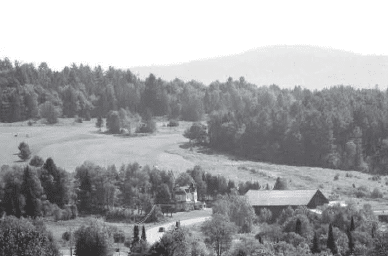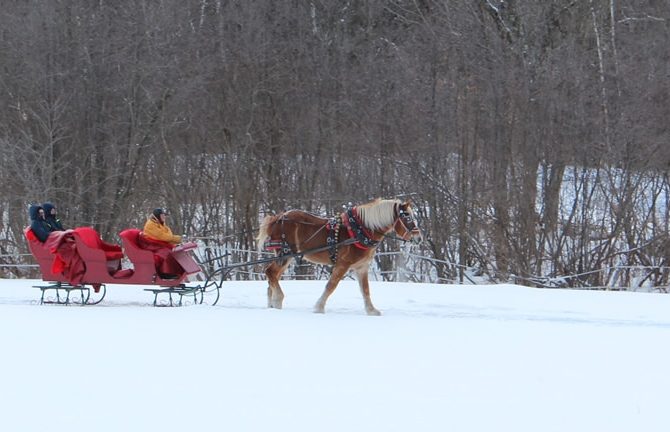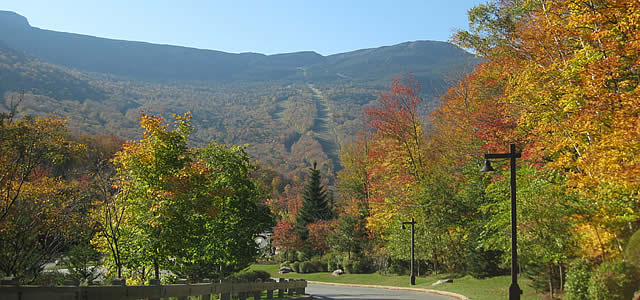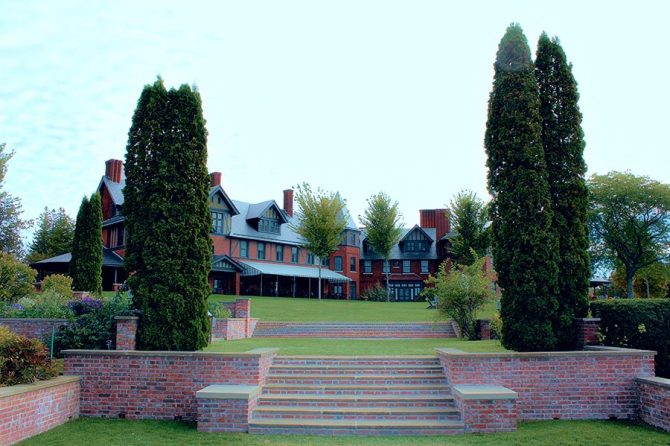by Sylvia Dodge (Courtesy of Scott Wheeler of Vermont's Northland Journal)
Travelers heading east on U.S. Route 2 out of St. Johnsbury drive through a small wedge of the tiny Vermont town named Kirby. On the left side of the highway stands a statuesque white house, and on the other side of Route 2 there is a huge old barn presiding over lowland cornfields alongside the Moose River.
Despite being in one of the least populated towns in Vermont (and Kirby also has only half of the acreage of most Vermont towns), the family that lived for generations along the Kirby stretch of the Moose River contributed a great deal to Vermont history. The Grout family lived in Kirby for at least four generations. From the Grout family came a Vermont governor, a United States Congressman, and a brigadier general.
Did the Grout Family Leave a Ghost Behind?
The Grout family may also have left a spirit in their ancestral home, whose ghostly footfalls and swishing petticoats still occasionally can be heard roaming the back bedrooms and hallways in the oldest section of the home. There was a house on the site beginning in the late 1700s, and part of the existing home can definitively be dated as far back as 1832.
The “Governor Grout House”
The Grout–Poulin home looks much as it did after it was renovated in the late 1800s by Congressman William Wallace Grout.
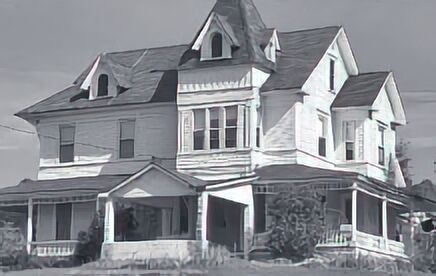
History buffs in the area almost always refer to the big white house in Kirby as the “Governor Grout house”—and it is true that Vermont’s 46th governor, Josiah Grout, spent a portion of his childhood in the home. It was his older brother, however, who made the Kirby property his home throughout much of his adult life.
William Wallace Grout had a career of government service that most would say matches the achievements of his brother. He was a lieutenant colonel during the Civil War, was brigadier general of the Vermont militia, served in the Vermont Legislature, and also served in the United States Congress.
William Grout was laid to rest in the hillside cemetery alongside U.S. Route 2 that looks out over his Kirby property.
From his gravesite you can see his stately home, the large barn he had constructed, and a riverside meadow thick with tall feed corn. The Governor Grout house is perhaps a misnomer. More appropriately, the stately Route 2 home should be called the Congressman Grout house.
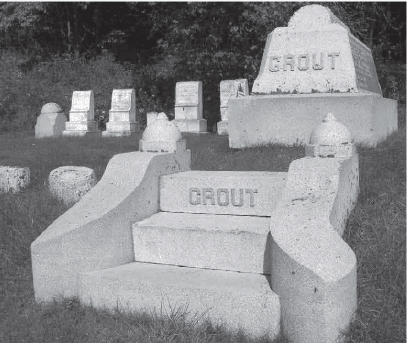
It was William’s grandfather, Theophilus Grout who first made his home in Kirby, moving there in 1792 from Charlestown, New Hampshire. At the time, it was not common to farm in river lowlands, but Theophilus had grown up alongside the Connecticut River and understood the agricultural value of fertile river meadows.
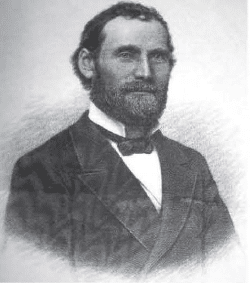
This photo of Congressman William Wallace Grout appeared in the 1887 edition of Hamilton Child’s Gazetteer of Caledonia and Essex Counties, Vt. Photos courtesy of Sylvia Dodge
Theophilus lived until he was 84 years old and set an example of public service for the generations of Grouts who followed. Theophilus was a justice of the peace, a tax collector, and served in the Vermont Legislature.
Josiah Grout was the sixth child born to Theophilus Grout. He spent most of his adult life residing in Compton, Quebec, and it was in that Canadian home that his two illustrious sons, Josiah Jr. and William, were born.
Josiah Grout Jr. was born on May 28, 1841, the third of ten children. As a youngster, he moved back to the family homestead in Kirby and was educated at the Orleans Liberal Institute in Glover, and then at St. Johnsbury Academy. During his high school tenure, the Civil War broke out, so he left school and enlisted as a private in Company 1, 1st Vermont Cavalry. He was mustered in as a 2nd lieutenant, eventually rising to the rank of major of Company M, Vermont Frontier Cavalry. He served on the Vermont–Canada border after the Confederate Raid on St. Albans. After participating in 17 battles, he was wounded and was discharged due to his wounds.
After the war he became a lawyer and a farmer, raising Jersey cattle, Morgan horses, and Shropshire sheep. He represented Newport in the Vermont General Assembly in 1872 and 1874 and then Derby for three more terms. In 1892 they elected him to the Vermont Senate serving Orleans County.
The Grout–Poulin Homestead as seen from the Grout family gravesite. U.S. Route 2 winds through, with the historic home on the left side of the road, and the large barn and cornfields on the other. On the far right, golf carts make their way up the meandering fairways of Kirby Golf Course.
The prime point of his political career came when he was elected the 46th governor of Vermont, serving from 1896 to 1898. During his term in office, he established the office of Vermont Attorney General. Gov. Grout served at a time when every two years the governance of the state was shifted between east and west. He was followed in the governor’s seat by Edward Curtis Smith of St. Albans. After serving as Vermont’s governor, Josiah served again in state government representing his hometown, Derby. He is buried in Derby Center Cemetery.
Josiah Grout – An Accomplished Man
Indeed, Josiah Grout was a very accomplished man, but his brother William also had an illustrious career in government service. In 1919, Josiah published a book about his older brother, five years senior, which he titled Memoir of General William Wallace Grout.
William Grout was the second born of Josiah and Sophronia Grout’s ten children. Like his brother Josiah Jr., he was born in Compton, Quebec, and moved back to Vermont as a child.
After high school, William attended law school in Poughkeepsie, New York, graduating in 1857. He established a law office in Barton, and in 1862 he was nominated for a position as State’s Attorney. Instead of taking that position, he joined the Army to fight in the Civil War. He recruited a company of men from Barton, serving as its captain, and then was commissioned as lieutenant colonel of the 15th Vermont Regiment, which was sent to Virginia and served in the Gettysburg campaign.
William was returned to Vermont the next year where a state militia had just been created and became brigadier general of the newly formed militia. That same year he was also elected to the post of State’s Attorney, holding that office for two years.
In 1866, William was elected to serve in the Vermont House of Representatives, where he served until 1876, when he was chosen to serve in the Vermont Senate, and where he quickly was named President Pro Tem. In 1880, he was elected to the 47th Congress of the United States and served eight terms there. While serving in Congress he worked to create the Secretary of Agriculture position in the President’s Cabinet. He was also well-known for a speech he delivered regarding the Oleo-Margarine Bill.
Although his work in government kept him away from home a lot of the time, in 1874 the family homestead in Kirby was conveyed to William Grout. He employed his brother-in-law Captain George Ford to manage the farm. At the time, the property consisted of 150 acres of pasture, 75 acres of timber, and 225 acres of pasturage.
A description of the property printed in the 1887 edition of Hamilton Child’s Gazetteer of Caledonia and Essex Counties, Vt. reads, “Here is a farm that for almost a century has made a comfortable home for three generations of a family whose success … has been wholly in Vermont, and who still cling to the old homestead.”
After William took possession of the property he purchased thoroughbred stock and built several new barns. The large barn that still stands was the largest barn in the region. He also completed extensive renovations to the house, bringing it to its present appearance. They etched the windows in the formal front doors with the letter “G”—a detail added in William’s era.
As well, the Grout family owned a farm in the town of Wheelock in the 1800s. In a remote section of Wheelock, which at one time was a thriving village known as Piperville, a small metal tag affixed to a tree marks the location of the Grout property.
In 1903, they used a lovely photograph of the Grout property in a promotional book, published by the Vermont Board of Agriculture, to lure gentlemen farmers from out-of-state to purchase Vermont farmsteads. The 500-acre Grout farm was listed at the time for sale at $20,000.
Recent History and Ghostly Past
Much of the original Grout property in Kirby remains intact, and has been owned since 1963 by Marc Poulin. On part of the farm—fields that once provided feed for the Grout family’s cattle—golfers now enjoy the scenic, nine-hole Kirby Golf Course, which opened in 2001.
Mr. Poulin, now 86 years old, made his living logging large tracts of forest throughout the region, and in real estate deals. At one time he purchased a township near Jackman, Maine, and in a short time, he turned a profit by selling the land to a paper company. On the Kirby property, he operated a company called Rus-Tique Brik, which he sold to a Quebec firm. The June 14, 1974, edition of the Montreal Gazette advertised the product as “now produced in Montreal.” The antique looking bricks were made of a dense aggregate concrete. In its heyday, 20,000 to 30,000 bricks were produced each day at the Kirby site and were dried in two large gas kilns located in the barn.
Is the Grout House Haunted???
For over 200 years, the Grout–Poulin land in Kirby has been a property to be proud of, graced with the spirit of hard work, successful industry, and public service—and perhaps there are other spirits too. Although Mr. Poulin disavows that there is any sort of ghostly presence haunting his house, his children and grandchildren tell stories of spooky sounds and eerie shadows that have recurred through all the generations that have lived in the home for the last half century.
It is believed that a woman who fell down a back stairway (the remnants of the stairway are now walled up) died in a bedroom in the old portion of the house. Four bedrooms are in that ell of the house, but they are used very seldom by family or visitors.
When Marc and Marietta Poulin moved their large family to the home, the youngest children were in third and fourth grade, and their bedrooms were in the back portion of the house. On one occasion while going to bed, the two children opened the door to the ell, and heard a person moving in one room, but there was nobody there. Consequently, the two children slept into their high school years on a couch and a cot in the downstairs section of the house, refusing to sleep upstairs.
Ghostly Footsteps Over the Kitchen
Recently, the caregiver who spends days with the elderly Mr. Poulin said that when her employer is napping in the afternoon, it is not unusual for her to hear footsteps over the kitchen, where the old bedrooms are located.
Perhaps all historic homes are haunted, but in the Grout's case – Poulin property, the rich history of the site contains enough stories and spirit to fill the imagination. The next time you travel east through Vermont on Route 2, take notice of the stately white house and barn in the tiny section of the highway that belongs to the town of Kirby, just east of St. Johnsbury. Think of it as the Congressman Grout House.
Sylvia Dodge was born and raised in St. Johnsbury. She has worked as an editor at the Journal Opinion, a weekly newspaper in Bradford, and at The Caledonian-Record, a daily newspaper in St. Johnsbury. She currently is employed as Director of Career and College Counseling at Lyndon Institute, and before that, worked as a guidance counselor at Craftsbury Academy. She has a passion for local history, gardening, and all things that have to do with the out-of-doors.
Thank you for reading this post, don't forget to subscribe to our email list for the latest news!


